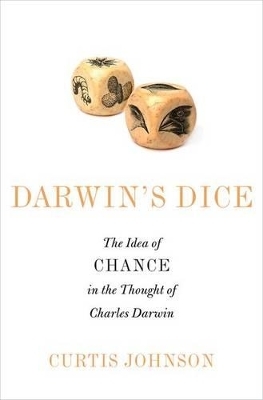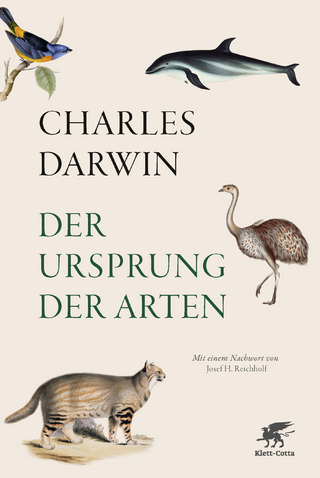
Darwin's Dice
The Idea of Chance in the Thought of Charles Darwin
Seiten
2014
Oxford University Press Inc (Verlag)
978-0-19-936141-0 (ISBN)
Oxford University Press Inc (Verlag)
978-0-19-936141-0 (ISBN)
Discusses the role of chance and randomness in the writings of Charles Darwin, as well as Darwinist thought.
For evolutionary biologists, the concept of chance has always played a significant role in the formation of evolutionary theory. As far back as Greek antiquity, chance and "luck" were understood to be key factors in the evolution of the natural world. Emphasizing chance is an entire way of thinking about nature, and it is also one of the key ideas that separates Charles Darwin from other systematic biologists of his time. Studying the concept of chance in Darwin's writing reveals core ideas in his theory of evolution, as well as his reflections on design, purpose, and randomness in nature's progression over the course of history.
In Darwin's Dice: The Idea of Chance in the Thought of Charles Darwin, Curtis Johnson does exactly that. He examines the work of Darwin in terms of his views on randomness and chance, and how the views changed as his work progressed. Randomness was a focal point for Darwin, and pursuing it as a theme helped significantly transform his research. Darwin's Dice shows us how Darwin defined "chance," and explores Darwin's influential architect metaphor in relation to the idea. Through the lens of randomness, Johnson reveals how Darwin's treatment of free will becomes more complex. This approach can shed light on many other quirks and points of interest in Darwin's work, including the curiously shifting presence of giraffes in subsequent drafts of On the Origin of Species. Johnson also reexamines Darwin's "Metaphysical Notebooks," and discusses the role Darwin felt that chance plays in morality and religion.
Darwin's Dice presents a new way to look at Darwinist thought and the writings on Charles Darwin. Curtis Johnson reveals that chance and randomness play a large part in Darwinist thought, and that we can better understand Darwin's work by understanding that part.
For evolutionary biologists, the concept of chance has always played a significant role in the formation of evolutionary theory. As far back as Greek antiquity, chance and "luck" were understood to be key factors in the evolution of the natural world. Emphasizing chance is an entire way of thinking about nature, and it is also one of the key ideas that separates Charles Darwin from other systematic biologists of his time. Studying the concept of chance in Darwin's writing reveals core ideas in his theory of evolution, as well as his reflections on design, purpose, and randomness in nature's progression over the course of history.
In Darwin's Dice: The Idea of Chance in the Thought of Charles Darwin, Curtis Johnson does exactly that. He examines the work of Darwin in terms of his views on randomness and chance, and how the views changed as his work progressed. Randomness was a focal point for Darwin, and pursuing it as a theme helped significantly transform his research. Darwin's Dice shows us how Darwin defined "chance," and explores Darwin's influential architect metaphor in relation to the idea. Through the lens of randomness, Johnson reveals how Darwin's treatment of free will becomes more complex. This approach can shed light on many other quirks and points of interest in Darwin's work, including the curiously shifting presence of giraffes in subsequent drafts of On the Origin of Species. Johnson also reexamines Darwin's "Metaphysical Notebooks," and discusses the role Darwin felt that chance plays in morality and religion.
Darwin's Dice presents a new way to look at Darwinist thought and the writings on Charles Darwin. Curtis Johnson reveals that chance and randomness play a large part in Darwinist thought, and that we can better understand Darwin's work by understanding that part.
Curtis Johnson is a Professor of Government at Lewis & Clark College. He has published many articles and chapters on the history of science and Darwinist thought.
Table of Contents ; Introduction ; 1. Two Faces of Chance ; 2. Chance Transport ; 3. Causes and Laws of Variation ; 4. Chance, Nature, and Intelligence ; 5. Darwin's Evolving Views about Chance ; 6. "So-Called Spontaneous Variation" ; 7. Darwin's Architect Metaphor ; 8. Darwin's Giraffes ; 9. Chance and Free Will ; 10. Chance and Human Morality ; Bibliography
| Zusatzinfo | 14 illustrations |
|---|---|
| Verlagsort | New York |
| Sprache | englisch |
| Maße | 155 x 236 mm |
| Gewicht | 499 g |
| Themenwelt | Naturwissenschaften ► Biologie ► Evolution |
| ISBN-10 | 0-19-936141-X / 019936141X |
| ISBN-13 | 978-0-19-936141-0 / 9780199361410 |
| Zustand | Neuware |
| Haben Sie eine Frage zum Produkt? |
Mehr entdecken
aus dem Bereich
aus dem Bereich
Komplette Neuübersetzung. Mit einem Nachwort von Josef H. Reichholf.
Buch | Hardcover (2018)
Klett-Cotta (Verlag)
48,00 €
Wie die Vernichtung der Arten unser Überleben bedroht - Der …
Buch | Softcover (2023)
Penguin (Verlag)
15,00 €


